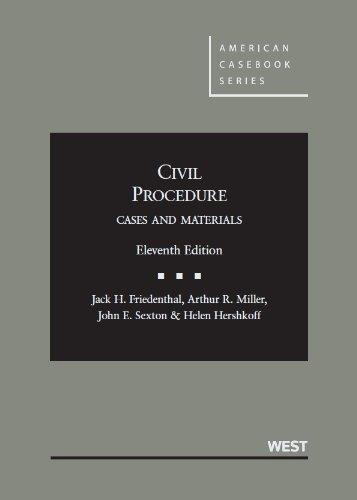7. DUSENBERY v. UNITED STATES, 534 U.S. 161, 122 S.Ct. 694, 151 L.Ed.2d 597 (2002), involved the...
Question:
7. DUSENBERY v. UNITED STATES, 534 U.S. 161, 122 S.Ct. 694, 151 L.Ed.2d 597
(2002), involved the adequacy of notice given to a prisoner by the Federal Bureau of Investigation prior to forfeiting property seized under the Controlled Substances Act, 21 U.S.C. § 801. The property consisted of about $30,000 and a car registered in petitioner’s step-mother’s name. The FBI published notice in a newspaper, and also sent letters by certified mail addressed to petitioner in care of the federal prison where he was incarcerated, to his residence at the time of arrest, and to an address where his step-mother lived. In challenging the forfeiture, Dusenbery claimed he had never received notice. A prison mailroom officer testified by telephone deposition that the officer had signed the certified mail receipt and that “the procedure would have been for him to log the mail in, for petitioner’s ‘Unit Team’ to sign for it, and for it then to be given to petitioner.” However, “a paper trail no longer existed because the Bureau of Prisons * * * had a policy of holding prison logbooks for only one year after they were closed.” Id. at 166, 122 S.Ct. 698, 151 L.Ed.2d at 603. Applying Mullane, the Court held that the government’s use of certified mail satisfied the Due Process Clause, and that additional steps would require “heroic efforts” and were not required. Id. at 170 71, 122 S.Ct. at 701, 151 L.Ed.2d at 606 07. Justice Ginsburg dissented, joined by Justices Stevens, Souter, and Breyer. The dissenting opinion criticized the prison’s mail-delivery procedure as “too lax to reliably ensure that a prisoner will receive a legal notice sent to him,” and emphasized “the evident feasibility of tightening the notice procedure ‘as
[would] one desirous of actually informing [the prisoner].’ ” Id. at 173, 122 S.Ct. at 702 03, 151 L.Ed.2d at 608. Should the government’s establishment of a general system for providing notice satisfy due process even if in the individual case defendant does not receive adequate notice?
Step by Step Answer:

Civil Procedure Cases And Materials
ISBN: 9780314280169
11th Edition
Authors: Jack Friedenthal, Arthur Miller, John Sexton, Helen Hershkoff






